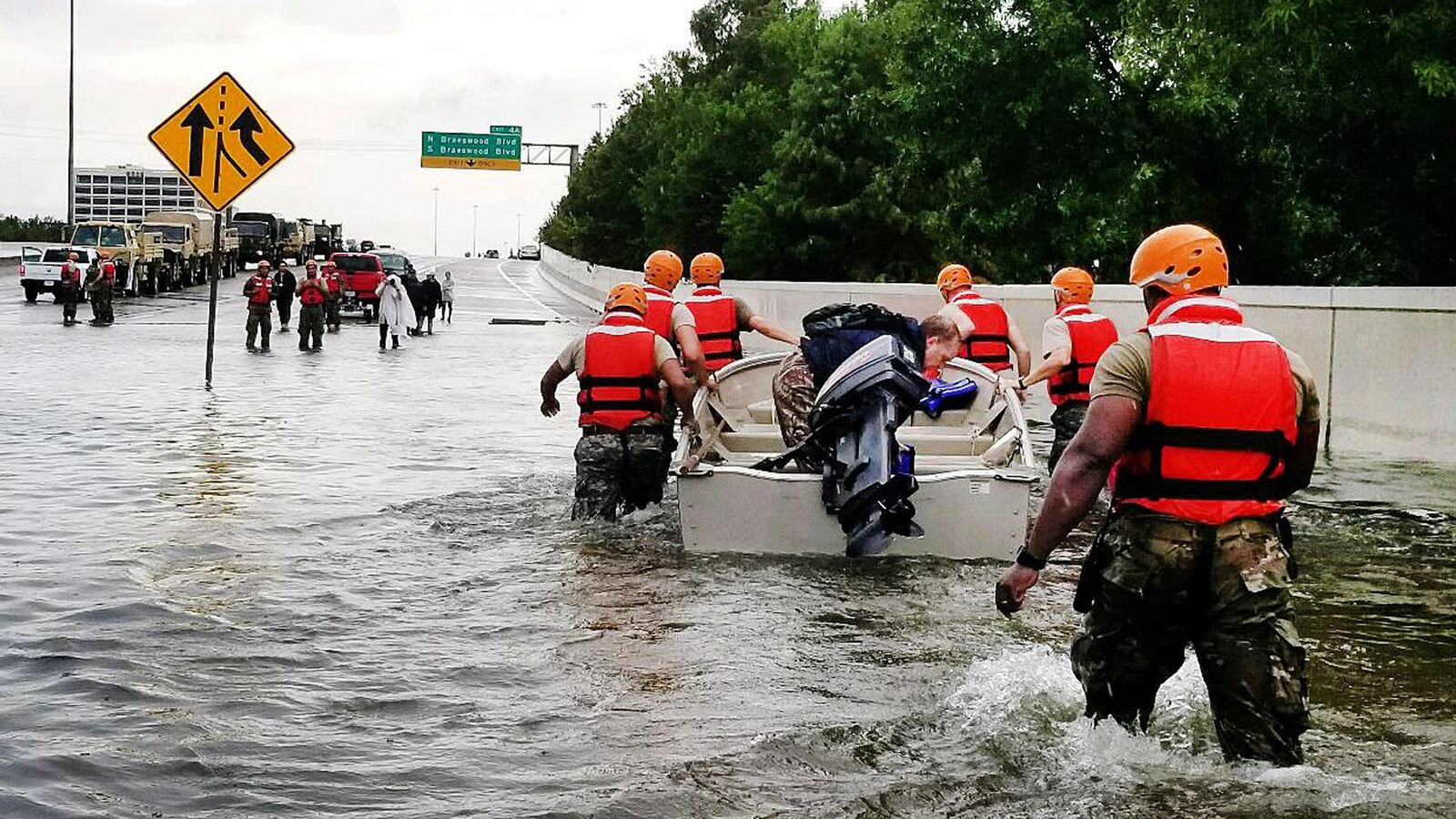KINGWOOD, Texas—The only thing harder than getting out of Houston is getting in.
Police were closing the roads into America’s fourth-largest city on Monday as rivers, tributaries, and ditches burst their banks and inundated highways. Cars driving south on I-96 had to turn around, resorting to retreat on the shoulder. Even 30 miles outside of downtown Houston, beyond the airport, there was four feet of water.
Rain lashed down on Monday morning after a brief pause on Sunday, bringing Tropical Storm Harvey’s total closer to 36 inches in as many hours. Another three feet of rain is expected in some areas; there was so much rain that the National Weather Service ran out of colors for its maps.
The first mandatory evacuations—four days after the governor called for people to get out—began on Monday morning along the Brazos River, southwest of Houston. The river is expected to swell to 60 feet and overtop levees there.
Dominic Druke lives on a hill just north of the river, where he and his family own chickens, rabbits, donkeys and two dogs.
“I’d leave right now if I didn’t have animals,” Druke told The Daily Beast.
Related: Texans Save Furry Friends from Harvey’s Wrath
Druke decided it was too dangerous for his wife and five young children though. They left last night before getting stranded on the road just miles from safety. A friend with a raised Jeep managed to rescue them, Druke said. A police car sits at the entrance of his neighborhood to prevent people from entering.
Druke said that he expects two feet of water in his house before it's over.
“Worst comes to worst, there’s the Cajun Navy,” Druke said of volunteers from Louisiana. “I might call them and see if I can get me and the dogs out.”
Druke isn’t alone in hoping for volunteer help: the federal government says it alone can’t handle the need for rescues.
“Texas has never seen an event like this,” FEMA Administrator Brock Long said at a Monday morning press conference in Washington, D.C. “What I need the media to do is organize the efforts, to help us organize citizen efforts, to ultimately help Texas. These people are in need.”
Help is coming from as far away as Los Angeles and Boston. Louisiana’s Department of Wildlife sent 10 trucks and 10 boats, with two more teams at the ready. The state’s volunteer “Cajun Navy” sent 20 boats on Sunday.
Countless locals manned flat-bottom boats and personal vessels to fish people from homes. Jim “Mattress Mack” McIngvale opened two of his stores to evacuees.
The Houston Fire Department said it has rescued 2,000 people so far, nearly 300 of them since midnight. More than 75,000 calls to 911 were made since Friday, officials said. There are more than 30,000 people in shelters, Mayor Sylvester Turner said. FEMA said it expects 450,000 to apply for disaster relief.
Gov. Greg Abbott activated the entire Texas National Guard, deploying 12,000 for search and rescue operations.
As of Sunday, 18 of the state's 254 counties—home to 7 million people—had been declared federal disaster areas. Another 50 are considered state disaster zones.
Port Aransas, 250 miles south of Houston on the Gulf coast was nearly destroyed in the 24 hours following Hurricane Harvey’s landfall. Buildings, houses, and novelty shops on the island reportedly collapsed under the weight of 130-mph winds. About 100 people stayed on the island, ignoring the calls to evacuate, and there is now no cell service, power, or water. A few reporters were allowed into the city to interview the now-frustrated residents who broke down in angry tears at an emergency operations center.
“We’ve lost everything," Melanie Zuraski told the San Antonio Express-News. "We didn’t have the means to leave. … Us people that live here and support this island don’t make a lot of money. So a lot of us stayed behind to go board up resorts and whatnot to make money. And by that time it was too late.”
— Emilie Plesset contributed to this report.






